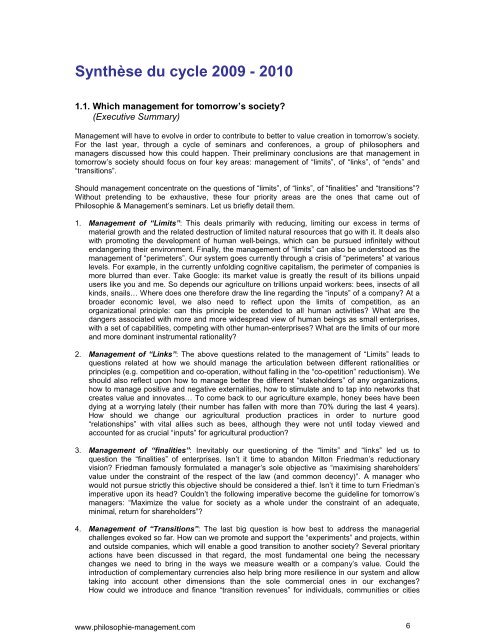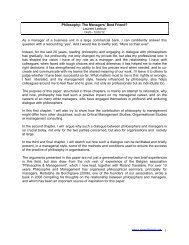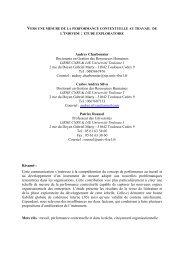Quel management pour la societe de demain - Philosophie ...
Quel management pour la societe de demain - Philosophie ...
Quel management pour la societe de demain - Philosophie ...
You also want an ePaper? Increase the reach of your titles
YUMPU automatically turns print PDFs into web optimized ePapers that Google loves.
Synthèse du cycle 2009 - 2010<br />
1.1. Which <strong>management</strong> for tomorrow’s society?<br />
(Executive Summary)<br />
Management will have to evolve in or<strong>de</strong>r to contribute to better to value creation in tomorrow’s society.<br />
For the <strong>la</strong>st year, through a cycle of seminars and conferences, a group of philosophers and<br />
managers discussed how this could happen. Their preliminary conclusions are that <strong>management</strong> in<br />
tomorrow’s society should focus on four key areas: <strong>management</strong> of “limits”, of “links”, of “ends” and<br />
“transitions”.<br />
Should <strong>management</strong> concentrate on the questions of “limits”, of “links”, of “finalities” and “transitions”?<br />
Without pretending to be exhaustive, these four priority areas are the ones that came out of<br />
<strong>Philosophie</strong> & Management’s seminars. Let us briefly <strong>de</strong>tail them.<br />
1. Management of “Limits”: This <strong>de</strong>als primarily with reducing, limiting our excess in terms of<br />
material growth and the re<strong>la</strong>ted <strong>de</strong>struction of limited natural resources that go with it. It <strong>de</strong>als also<br />
with promoting the <strong>de</strong>velopment of human well-beings, which can be pursued infinitely without<br />
endangering their environment. Finally, the <strong>management</strong> of “limits” can also be un<strong>de</strong>rstood as the<br />
<strong>management</strong> of “perimeters”. Our system goes currently through a crisis of “perimeters” at various<br />
levels. For example, in the currently unfolding cognitive capitalism, the perimeter of companies is<br />
more blurred than ever. Take Google: its market value is greatly the result of its billions unpaid<br />
users like you and me. So <strong>de</strong>pends our agriculture on trillions unpaid workers: bees, insects of all<br />
kinds, snails… Where does one therefore draw the line regarding the “inputs” of a company? At a<br />
broa<strong>de</strong>r economic level, we also need to reflect upon the limits of competition, as an<br />
organizational principle: can this principle be exten<strong>de</strong>d to all human activities? What are the<br />
dangers associated with more and more wi<strong>de</strong>spread view of human beings as small enterprises,<br />
with a set of capabilities, competing with other human-enterprises? What are the limits of our more<br />
and more dominant instrumental rationality?<br />
2. Management of “Links”: The above questions re<strong>la</strong>ted to the <strong>management</strong> of “Limits” leads to<br />
questions re<strong>la</strong>ted at how we should manage the articu<strong>la</strong>tion between different rationalities or<br />
principles (e.g. competition and co-operation, without falling in the “co-opetition” reductionism). We<br />
should also reflect upon how to manage better the different “stakehol<strong>de</strong>rs” of any organizations,<br />
how to manage positive and negative externalities, how to stimu<strong>la</strong>te and to tap into networks that<br />
creates value and innovates… To come back to our agriculture example, honey bees have been<br />
dying at a worrying <strong>la</strong>tely (their number has fallen with more than 70% during the <strong>la</strong>st 4 years).<br />
How should we change our agricultural production practices in or<strong>de</strong>r to nurture good<br />
“re<strong>la</strong>tionships” with vital allies such as bees, although they were not until today viewed and<br />
accounted for as crucial “inputs” for agricultural production?<br />
3. Management of “finalities”: Inevitably our questioning of the “limits” and “links” led us to<br />
question the “finalities” of enterprises. Isn’t it time to abandon Milton Friedman’s reductionary<br />
vision? Friedman famously formu<strong>la</strong>ted a manager’s sole objective as “maximising sharehol<strong>de</strong>rs’<br />
value un<strong>de</strong>r the constraint of the respect of the <strong>la</strong>w (and common <strong>de</strong>cency)”. A manager who<br />
would not pursue strictly this objective should be consi<strong>de</strong>red a thief. Isn’t it time to turn Friedman’s<br />
imperative upon its head? Couldn’t the following imperative become the gui<strong>de</strong>line for tomorrow’s<br />
managers: “Maximize the value for society as a whole un<strong>de</strong>r the constraint of an a<strong>de</strong>quate,<br />
minimal, return for sharehol<strong>de</strong>rs”?<br />
4. Management of “Transitions”: The <strong>la</strong>st big question is how best to address the managerial<br />
challenges evoked so far. How can we promote and support the “experiments” and projects, within<br />
and outsi<strong>de</strong> companies, which will enable a good transition to another society? Several prioritary<br />
actions have been discussed in that regard, the most fundamental one being the necessary<br />
changes we need to bring in the ways we measure wealth or a company’s value. Could the<br />
introduction of complementary currencies also help bring more resilience in our system and allow<br />
taking into account other dimensions than the sole commercial ones in our exchanges?<br />
How could we introduce and finance “transition revenues” for individuals, communities or cities<br />
www.philosophie-<strong>management</strong>.com 6
















